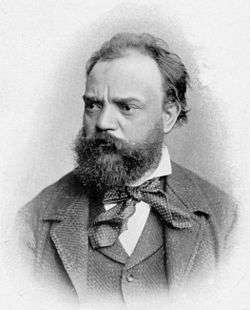King and Charcoal Burner
| Antonín Dvořák |
|---|
 |
|
Operas
|
King and Charcoal Burner (Czech: Král a uhlíř), Op. 14, is a three-act (23-scene) comic opera by the Czech composer Antonín Dvořák.
The first version of the opera was written in 1871 to a libretto by Bernard J. Lobeský. That same year the composer offered the finished opera to the Czech Provisional Theatre in Prague. Bedřich Smetana, who was in charge of the opera at that time, returned the work to Dvořák the following year, claiming it was unperformable.
Dvořák created entirely new music to the same libretto – without using any of the original material. This new version was finished in 1874 and the première took place on 24 November 1874. By that time, Smetana already was no longer the chief conductor. (He became deaf in 1874.) Despite a good reception from both critics and audience, the opera was withdrawn after only four performances. Dvořák made another substantial revision in 1887, the premiere of which was conducted on 15 June 1887 by Mořic Anger. The libretto was partially refashioned by Václav Juda Novotný and Dvořák made modifications particularly to the third act.
An edition of the opera prepared by Karel Kovařovic exists, and is the basis for a recording on Supraphon.
Roles
| Role | Voice type | Premiere cast, 24 November 1874 (Conductor: Adolf Čech) |
|---|---|---|
| King Matyáš | baritone | Josef Lev |
| Jindřich, Burgrave of Křivoklát | tenor | Jan Šára |
| Matěj, coal-burner in the Křivoklát forests | bass | Karel Čech |
| Anna, his wife | contralto | Betty Hanušová (later Fibichová) |
| Liduška, his daughter | soprano | Marie Zofie Sittová |
| Jeník, young charcoal burner | tenor | Antonín Vávra |
| Eva | soprano | Ema Maislerová-Sáková |
| First knight | tenor | |
| Second knight | bass |
Synopsis
The theme of the opera is from old legend of the rescue of a Czech ruler (probably prince Jaromír of Bohemia of the Přemyslid dynasty, or his brother Oldřich of Bohemia) who gets lost in the woods of Křivoklát. One of the main characters – the charcoal burner Matěj – was taken by Lobeský from the puppet theatre play Feast Day in Hudlice (based on the same theme). Lobeský also replaced the Přemyslid king with the Habsburg Emperor Matthias (and thus shifted the action from the 11th to the 17th century). As Matěj is the familiar form of Matthias in Czech, Dvořák gained two characters with the same names – one poor, one rich. The king mingles incognito among the common folk (a frequently recurring theme in Czech culture of that time), so the plot is based on the merging of the worlds of the aristocracy and the common folk.
Recordings
- King and Charcoal Burner. Supraphon 1989. SU 3078-2 611. (Prague National Theatre, Josef Chaloupka)
References
- Burghauser, Jarmil: Antonín Dvořák. Prague: Koniasch Latin Press, 2006. ISBN 80-86791-26-2
- The New Grove Dictionary of Opera (Stanley Sadie ed.), 1992, p. 992. ISBN 0-935859-92-6
- Tyrrell, John, 1988, Czech Opera, Cambridge University Press, pp. 81–82. ISBN 0-521-23531-6
External links
- 1st setting of King and Charcoal Burner (King and Collier) on a comprehensive Dvorak site
- 2nd setting of King and Charcoal Burner (King and Collier) on a comprehensive Dvorak site